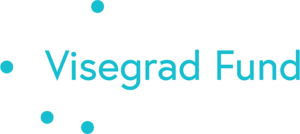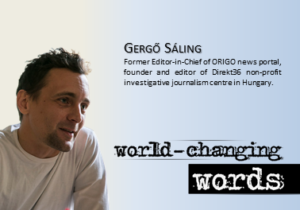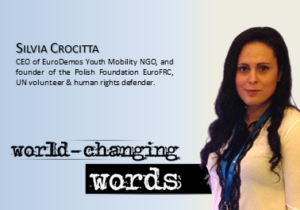World-changing Words – training course for young journalists
Project background
The increasing multiculturalism in Visegrad countries poses a challenge to journalism. Given the signifying power of the news media, the ways in which news represents various ethnic communities, issues related to multiculturalisation and the changing society have significance in relation to the positions of various groups and to the relations between them. Recent surveys show ethnic minorities are still largely absent from opinion pages, senior roles and staff. Moreover, despite the diverse ethnic feature of the Visegrad countries only a few minority (e.g. Roma, Turkish, Jewish) press centres exist with limited content and access along fault lines.
Project aim and objectives
The project primarily aimed for a responsible journalism. Specifically, it aimed to train young professionals who are not only aware of societal issues affecting the V4 region but also interested in exchange of information through journalism or by writing. This is in line with the goal of the V4 member countries in preserving and promoting cultural cohesion and cooperation within the region and in the EU as a whole. By inviting future journalists, their contribution of articles and blog entries about minority-related issues raise awareness concerning minority issues. The newly published articles draw attention on under-represented communities in the V4 region. The project also involved members of minority groups thus enhancing their opportunities in the labour market. The project is funded by Visegrad Fund. [http://visegradfund.org]
Intellectual outcomes and media coverage
During the training participants were asked to write an article of 350-500 words about a predefined minority-related topic during the activity and a 1-page-long blog entry about a chosen topic within 2 weeks after the training. The blog entries can be accessed among the publications on the ICRP website while the collection of articles can be downloaded directly from here.
Hungarian Public Radio made a report about the event including four short interviews with participants, experts and organisers. The Hungarian extract of the report can be accessed here.
Activity and profile of participants
A training course with 12 participants from 4 countries and 3 lecturers.
1st day – theoretical day: introduction, principles of journalism, minority perspectives in the media, work with resources, researching
2nd day – theoretical & practical day: journalism genres, opinion pieces and blog, case study, writing of articles
3rd day – practical day: writing of articles, presentation, evaluation
Duration
3 days between 15 and 17 May 2017. The training started at 2 p.m. on the 15th of May and finished at 4 p.m. on the 17th of May.
Participants and partner organisations
12 participants and 3 lecturers coming from the Visegrad Group (V4) countries.
Partner organisations are:
► Mladiinfo (Czech Republic)
► Institute for Cultural Relations Policy (Hungary)
► European Foundation for Human Development (Poland)
► Youth Empowerment in a European Society (Slovakia)
Experts
Three experts from the Czech Republic, Hungary and Poland held lectures and facilitate the learning process during the three days of the training course.
|
|
|
|
Participants and organisers
Participants: Mehmet Sadik Bektaş, Tamar Buachidze, Kristýna Dvouleta, Barlomiej Gradecki, Martina Mäsiarová, Kaifulwara Mubbashir Memon, Júlia Németh, Domonkos Ottlik, Adrienn Prieger, Barbora Schneiderová, Aleksandra Stalmach, L’ubica Stančíková
Organisers: Mirjam Szakács and András Lőrincz
Participants profile
This project has been designed and developed to be addressed to young journalists, students of entry-level journalism studies and young people interested in press, media and minority-related issues.
In order to be eligible as a participant, it is necessary to be legally resident in the country in which the sending organisation is registered. The participants should be:
• young people between 18-35, preferably but not limited to those who want to become journalists or about to start Journalism studies; university students in Journalism, or those with Political Science or International Relations and related fields educational background,
• have good communicative level and writing skills of English.
Each partner selects at least one participant with different ethnic background in order to represent one of the ethnic communities of their respective country.
Photos
The photo album can be reached on Facebook at https://www.facebook.com/pg/culturalrelations/photos/?tab=album&album_id=1525182374212773
Info Pack
Download pdf [1.9MB]
Training schedule
Please keep in mind that the draft agenda is subject to change!
| 15 May | 16 May | 17 May | |
| 08:00-09:00 |
Arrival
|
Breakfast | Breakfast |
| 09:30-11:00 | Session III. (Journalism genres) | Individual work on articles | |
| 11:00-11:30 | Break | Break | |
| 11:30-13:00 | Session IV. (Opinion pieces and blog) | Individual work on articles | |
| 13:00-14:00 | Lunch | Lunch | |
| 14:00-14:30 | Introduction |
Individual work on articles
|
Presentation
|
| 14:30-15:30 |
Session I. (Principles of journalism)
|
||
| 15:30-16:00 | Evaluation | ||
| 16:00-16:30 | Break | Break |
Departure
|
| 16:30-18:00 |
Session II. (minority perspectives in the media, work with resources, researching, preparing for next day starting articles)
|
Individual work on articles | |
| 18:00-19:00 | Session V. (Case study) | ||
| 19:00-20:00 | Dinner | Dinner |



